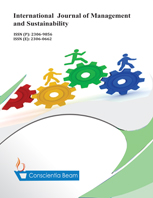What factors affect the adoption of cloud-based ERP in companies' operations in Malaysia?
DOI:
https://doi.org/10.18488/11.v13i3.3827Abstract
The objective of this study is to ascertain the determinants that prompt organizations to embrace the cloud-based enterprise research planning (ERP) system with the intention of diminishing closing time and enhancing user performance. In addition, it is necessary to construct a comprehensive model that encompasses the various elements that influence firms' decisions to use cloud-based Enterprise Resource Planning (ERP) systems. These considerations include the impact of the pandemic, performance expectations, facilitating conditions, effort expectations, behavioral intentions, and the adoption of software specifically designed for cloud-based ERP functionality. The present study employed a questionnaire survey as a means of data collection, specifically targeting employees of ERP organizations to obtain primary data. The present study employed the Unified Theory of Acceptance and Technology Use 2 (UTAUT2) as the theoretical framework to establish the variable, utilizing Structural Equation Modeling-Partial Least Squares (SEM-PLS). The authors have indicated that various aspects, including the pandemic effect, performance expectance, enabling situation, effort expectation, behavior intention, and software (specifically, cloud-based ERP), have been found to have a beneficial influence on cloud-based ERP. This research study provides novel management insights that enhance the existing body of knowledge on cloud-based enterprise resource planning (ERP) systems. Specifically, it examines the moderation model in the context of manufacturing enterprises located in Malaysia. There is ample opportunity to employ several theoretical frameworks, including the theory of consumer satisfaction. Still, the scope of this study did not encompass small and medium-sized enterprises (SMEs) or industries in general.

